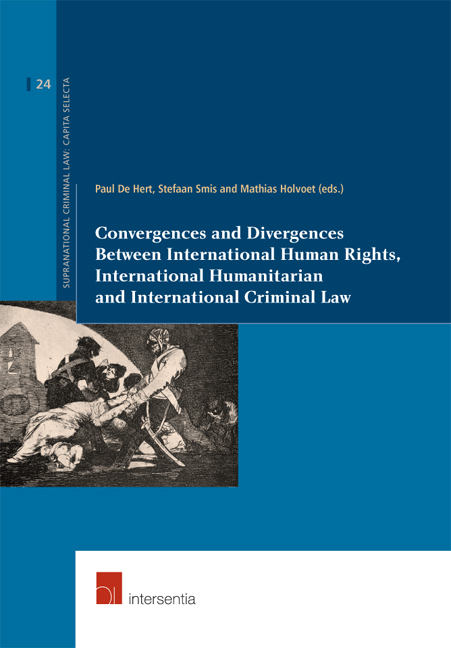Book contents
- Frontmatter
- Foreword
- Preface
- Contents
- About the Contributors
- Part I Convergences and Divergences between International Human Rights Law and International Criminal Law Stricto Sensu
- Catalytic, Gap-filling or Retardant Effects of Icl on Hrl: Quid Juris
- Use of Human Rights in International Criminal Law: Influence or Appearances of Legitimacy?
- The Future of the International Criminal Court: A Non-human Rights Body?
- Part II Convergences and Divergences between International Human Rights Law and Transnational Criminal Law
- Part III Convergences and Divergences between International Human Rights Law and International Humanitarian Law
- Conclusion
- Index
- About the Editors
The Future of the International Criminal Court: A Non-human Rights Body?
from Part I - Convergences and Divergences between International Human Rights Law and International Criminal Law Stricto Sensu
Published online by Cambridge University Press: 11 October 2018
- Frontmatter
- Foreword
- Preface
- Contents
- About the Contributors
- Part I Convergences and Divergences between International Human Rights Law and International Criminal Law Stricto Sensu
- Catalytic, Gap-filling or Retardant Effects of Icl on Hrl: Quid Juris
- Use of Human Rights in International Criminal Law: Influence or Appearances of Legitimacy?
- The Future of the International Criminal Court: A Non-human Rights Body?
- Part II Convergences and Divergences between International Human Rights Law and Transnational Criminal Law
- Part III Convergences and Divergences between International Human Rights Law and International Humanitarian Law
- Conclusion
- Index
- About the Editors
Summary
INTRODUCTION
Discussion about the interaction between human rights law (HRL) and international criminal law (ICL) is gaining momentum in scholarly circles. This is not unexpected. Human rights issues are continuously lurking in the background of international criminal trials. It is difficult to imagine international criminal justice without its HRL component – legal guarantees afforded to different parties in the process as well as principles underlying substantive offences in international law. The Rome Statute of the International Criminal Court (ICC) expressly requires that the legal sources used by the Court must be interpreted consistently with internationally recognised human rights standards. The relevance of HRL for international criminal trials seems to be implicitly acknowledged, but is rarely studied or analysed systematically.
However, can one equate the ICC to a human rights body? To what extent does its mission converge with the mandate of its regional human rights counterparts – the European Court of Human Rights (ECtHR) and the Inter- American Court of Human Rights (IACtHR) – in upholding and reinforcing human rights? Vasiliev has argued that there exists a strong normative pull to ensure the tribunals’ (and presumably the ICC's) conformity with HRL. It results in an informal hierarchy, in which deference to human rights courts is seen as an aspect of good judging. This tendency stems from a concern shared by both sets of courts to protect human rights from abuses as well as to ensure fair administration of criminal justice. Informal supremacy of human rights case law – or ‘the asymmetry of influence’ – is the result of the uneven mutual substantive relevance of the two disciplines reinforced by the expectation that the ad hoc tribunals would treat human rights jurisprudence with deference – a belief internalised by international judges. Vasiliev has acknowledged the links between ICL and IHRL, but has argued against the normative rhetoric of ‘cross-fertilisation’ – widely accepted in scholarly circles – as it misconstrues the tribunals’ engagement with the regional human rights courts and is incapable of enhancing human rights compliance by the ad hoc tribunals.
This chapter continues this line of discourse by invoking an empirical example evidencing the limitations that the ICC faces when incorporating human rights norms in its judicial reasoning.
- Type
- Chapter
- Information
- Convergences and Divergences Between International Human Rights, International Humanitarian and International Criminal Law , pp. 49 - 70Publisher: IntersentiaPrint publication year: 2018

